Workshop 2: “What solutions to the expansion of violent extremism: between collective approaches and national responses”
Contexte
For several years, protean violence has taken hold in several parts of the continent, hindering initially promising development prospects. The exacerbation of threats, the resurgence of intercommunal conflicts, the rise of violent extremism and related transnational organized crime continue to destabilize Africa. To stem the spread of violent extremism, several solutions have been implemented, including security and development. But the observation remains almost invariable: this violence, often based on. But the observation remains almost invariable: this violence, often based on the exploitation of the frustrations of local populations and fueled by a recurrent discourse on the real or supposed marginalization of certain communities, persists, develops and even expands geographically.
The current modes of action of violent extremist groups and their capacity to adapt and coordinate locally, nationally and internationally, must lead States and all other public security actors to favour a combination of inclusive national approaches and collective approaches based on ad-hoc organizations, the RECs and the African Union. In this perspective, the priority issues to be addressed are, on the one hand, the exit from the “all-security” approach and the active or passive participation of all national actors in the prevention and fight against violent extremism, and on the other hand, the identification of channels for the exchange of operational information between actors, particularly in border areas, and the realization of conditions for cooperation between States and organizations. This involvement of all national actors is an absolute priority. Finally, a more assertive commitment by African countries in their cooperation with external partners and the pooling of their capacities deserve greater attention.
Objectives
Propose realistic responses to the current challenge of the trend toward the expansion of violent extremism on the continent, through national approaches and collective actions under the aegis of the the AU, RECs, or ad hoc security cooperation structures.
Issues to be addressed
- What solutions to have national security systems capable of countering the expansion of violent extremism?
- How to strengthen cooperation in the fight against violent extremism between States at the sub-regional and regional levels?
- What inclusive national approach to effectively address the multidimensional nature of violent extremism?
- What role should international partners play in the fight against the spread of violent extremism?
Speakers
-
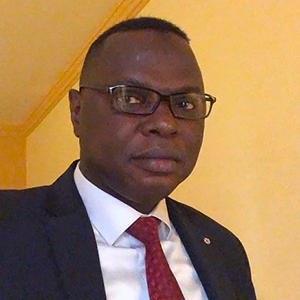 Abdourahmane DIENGSpeaker
Abdourahmane DIENGSpeakerLAWYER, DIPLOMAT, STRATEGIST, AND POLITICAL SCIENTIST
SPECIALIST IN SECURITY POLICIES
Knight in the National Order of Merit of Senegal
Knight in the Order of Maritime Merit of Côte d’Ivoire
Medal of Maritime Merit of the Gulf of GuineaDoctor Abdourahmane DIENG was born on March 31, 1964 in Dakar, Senegal. He graduated from the Prytanée Militaire of
Saint louis du Sénégal, he was trained at the Royal Military Academy of Meknes, in Morocco, at the
of the National Gendarmerie Officers School of Melun.
Academically, Dr. Dieng Abdourahmane holds:
– University Diploma of Law and Criminal Sciences (DUDSC) from the University of Paris Sud, in
France
– Bachelor’s degree in Law, specializing in Public Administration from Mohamed V University in Rabat, Morocco
Morocco;
– Master’s degree in Public Law and Political Science (International Relations option) from the University
Cheikh Anta Diop University in Dakar, Senegal;
– Diploma of Advanced Studies in Political Science (option Defense and Security) from the University
Cheikh Anta Diop University in Dakar, Senegal.
– Diplôme d’Etudes Supérieures Spécialisées en Droits fondamentaux de l’Université de Nantes, in
France;
– Diplôme d’Etudes Supérieures Spécialisées en Diplomatie et Stratégie from CEDS in Paris, France,
– Master of Management of Peace and Security in Africa (MPSA), Institute of Peace and Security
Studies (IPSS), University of Addis Ababa, Ethiopia
– Master of Strategy and Security Administration (MASSA) from the Nigerian Defense Academy;
– PhD on Political Science – Atlantic International University, USA;
– PhD on Strategic and Security Studies, Of Nasarawa State University of Keffi (NSUK), Nasarawa,
Nigeria
After 21 years in the infantry, the National Gendarmerie and the Ministry of Armed Forces of Senegal, the
Senegal, the former Permanent Secretary of the National Commission to Combat the Proliferation of Small Arms and Light Weapons
Commission against the proliferation of Small Arms and Light Weapons of Senegal, was recruited in 2005, on a permanent basis, by the
Commission as Program Officer for Small Arms and Light Weapons. Since 2008, he is the Head of Regional Security
Permanent Secretary of the West African Police Chiefs Committee, in charge of the fight against
Terrorism, Violent Extremism and Border Security, Security Sector Governance Reform
the fight against Transnational Organized Crime (TOC), the Coordination of Security
Security Services Committees (SSCC) and Intelligence and Maritime Security in West Africa.
West Africa. He is the ECOWAS Sahel Focal Point. -
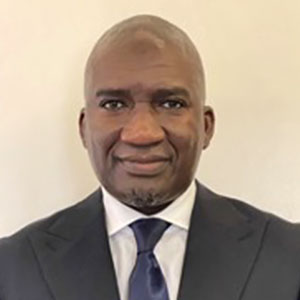 Amadou Tidiane CISSÉTalker
Amadou Tidiane CISSÉTalkerAmadou Tidiane CISSE is a Senior Customs Inspector. He is currently Head of the Security and Compliance Co-ordination Office. He worked before at the Port of Dakar where he held the positions of Auditor and subsequently Head of sections and as a Technical Writer at the Customs Offices Directorate of Legislation and Studies. He holds a degree from Senegal’s National School of Administration, a postgraduate diplome in Sociology and a master II Petrol, gas and Renewable energies. He is the author of “Terrorism beyond borders” and “Offshore states and petroterrorism” Ed Harmattan 2022.
-
Laure-Olga GONDJOUTModerator
-
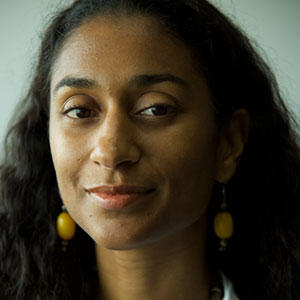 Lori-Anne THÉROUX BENONISpeaker
Lori-Anne THÉROUX BENONISpeakerRegional Director for West Africa, the Sahel and the Lake Chad Basin, Institute for Security Studies
Dr Lori-Anne Théroux-Bénoni leads a team of researchers based in Dakar, Bamako, Abidjan, Abuja and N’Djamena. The Office works on key policy issues in the region such as violent extremism and terrorism, political instability, local conflicts, peace operations and political processes. Prior to joining the ISS in 2012, she worked as a researcher with the Network on Peace Operations at the University of Montreal. Lori-Anne has a PhD in anthropology from the University of Toronto.
-
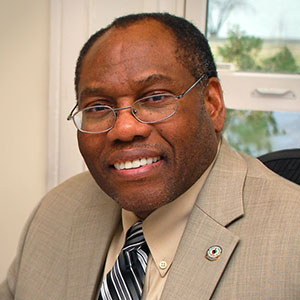 Mathurin C. HOUNGNIKPOTalker
Mathurin C. HOUNGNIKPOTalkerProfessor
Prof. Mathurin C. Houngnikpo, independent researcher, is an expert in strategy, security sector reform and democratic governance. He has served as a Strategic Advisor in Côte d’Ivoire, Mali and elsewhere. He was Professor and Chair of Civil-Military Relations at the Africa Center for Strategic Studies (ACSS). He holds a Ph.D. in Political Science from the University of Paris VIII, Saint-Denis, France and another Ph.D. in International Studies from the University of Denver (USA).
-
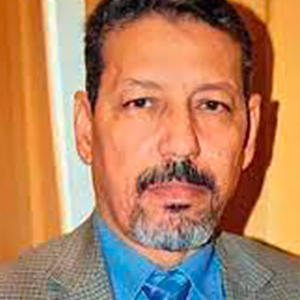 Mohamed Znagui OULD SID'AHMED ELYSpeaker
Mohamed Znagui OULD SID'AHMED ELYSpeakerBrigadier General Mohamed Znagui Sid ‘Ahmed Ely did his primary and secondary studies in Mauritania before joining the Royal Military Academy of Meknes in Morocco from 1978 to 1981 where he followed his initial training as an officer. He exercised several functions in Command in Schools and in Staff before completing his higher education in Mauritania, in France and in China.
He then reached the high functions of Command and Staff before joining the Military Diplomacy.He was appointed to the rank of Brigadier General on January 1, 2012 and was appointed Chief of the Joint Staff Committee of the CEMOC in Tamanrasset then Inspector General of the Armed Forces and Security before being admitted to the reserve on February 20, 2014.
Gl M.Znagui is currently a Defense and Security expert at the G5 Sahel. He is married with 6 children and holds a degree in Law from Mohamed 5 University in Rabat and an Executive MBA in Global Risk Management and International Programs from THEMIIS Institute in France. France -
 Sayoko UESUIntervenante
Sayoko UESUIntervenanteResearch Associate, National Graduate Institute for Policy Studies (GRIPS)
Her area of expertise is political economy and security issues in the Sahel and West Africa, as well as Japan’s foreign and development policy towards Africa. She has also joined the Institute for African Studies at Meiji University in Tokyo as a visiting researcher since 2020. Besides her academic career, she worked as an advisor for African issues at the Japanese Embassy in France, and as an analyst on international terrorism at the Intelligence and Analysis Service of the Ministry of Foreign Affairs.
